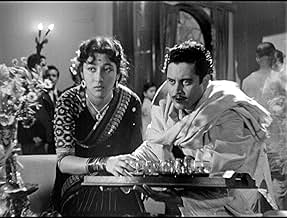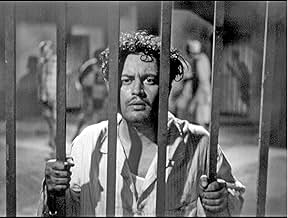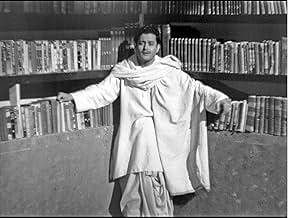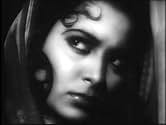NOTE IMDb
8,3/10
7,7 k
MA NOTE
Vijay, poète talentueux mais sans le sou, lutte pour l'amour et la reconnaissance dans ce monde égoïste.Vijay, poète talentueux mais sans le sou, lutte pour l'amour et la reconnaissance dans ce monde égoïste.Vijay, poète talentueux mais sans le sou, lutte pour l'amour et la reconnaissance dans ce monde égoïste.
- Réalisation
- Scénario
- Casting principal
Rehman Khan
- Ghosh
- (as Rehman)
Leela Mishra
- Vijay's Mother
- (as Leela Misra)
Moni Chatterjee
- Chatterjee
- (as Moni Chatterji)
Avis à la une
If you are not familiar with the history of Hindi films and are led by the high ratings here to expect a big masala movie indicative of contemporary Bollywood films, you may come away from this film scratching your head and wondering where the high ratings came from--particularly if you are new to Hindi cinema ( as opposed to " Bollywood").HOWEVER, having said that, let me encourage those who are unfamiliar with what is known as the "Golden Age" of Hindi cinema and the historical times that gave birth to this film to do some reading and THEN watch it. 1951 was only 4 years after partition, but unfortunately, many Indians were already becoming disenchanted with the new government's ability, or lack thereof, to bring about the sweeping changes many had hoped would come with the new beginning for the new country. Pyassa came at a time of disenchantment and soul-searching as the new socialist, secular India struggled to find her footing. (Author Tejaswini Ganti does an excellent job illuminating this very different yet important time in Hindi Cinema.) It presents a very bleak picture of greed and corruption, and yet there is a small beacon of hope for understanding, for good to find a way to continue, for equality to stand against injustice, hope for the future. Understanding this is integral to appreciating WHY this is considered one of the greatest films in Hindi cinema history. Learn, watch and enjoy.
Dutt had been toying with the idea of making 'Pyaasa' for four years. Some of the film echos part of his life story but not as close as the tragedy 'Kaagaz ke Phool' did. It's also very similar to a recent movie I have seen, namely Ghose's 'Yatra'. Maybe Ghose made 'Yatra' as a tribute to Dutt's 'Pyaasa'. 'Pyaasa' is the story of a talented poet Vijay, who struggles through life trying to get his poems published. But, in this materialist world where money and fame rule, there is no one willing to give Vijay's poetry a chance, except one person, a streetwalker called Gulabo. Gulabo is captured by the beauty of his poetry but what can she can do to get the poems published?
'Pyaasa' starts in an unconventional but beautiful way. We see Vijay lying on the park. The poet smiles as he's captured by a bee buzzing over a flower. The smile vanishes as a man's shoe carelessly squashes the bee. This already reflects society's careless attitude towards him. Even Vijay's former lover Meena dumped him because she preferred someone with more wealth.
Murthy's cinematography is outstanding making 'Pyaasa' a visual treat. The songs and poems are beautiful and they are a powerful part of the narration as they reflect moments such as Vijay's love for Meena, Gulabo's love for Vijay's poetry, the brothel where people are traded and the devious society. There are so many wonderful scenes. The moments between Vijay and Gulabo are some of my favorites.
The performances are top notch. Guru Dutt becomes Vijay and allows the viewer to feel his struggles. Waheeda Rehman is breathtaking and plays her part to perfection. Mala Sinha and Rehman do very well. Johnny Walker is hilarious.
'Pyaasa' is Dutt's achievement on multiple levels. One of the best of Indian cinema and no wonder why he's recognized as one of the greatest filmmakers.
'Pyaasa' starts in an unconventional but beautiful way. We see Vijay lying on the park. The poet smiles as he's captured by a bee buzzing over a flower. The smile vanishes as a man's shoe carelessly squashes the bee. This already reflects society's careless attitude towards him. Even Vijay's former lover Meena dumped him because she preferred someone with more wealth.
Murthy's cinematography is outstanding making 'Pyaasa' a visual treat. The songs and poems are beautiful and they are a powerful part of the narration as they reflect moments such as Vijay's love for Meena, Gulabo's love for Vijay's poetry, the brothel where people are traded and the devious society. There are so many wonderful scenes. The moments between Vijay and Gulabo are some of my favorites.
The performances are top notch. Guru Dutt becomes Vijay and allows the viewer to feel his struggles. Waheeda Rehman is breathtaking and plays her part to perfection. Mala Sinha and Rehman do very well. Johnny Walker is hilarious.
'Pyaasa' is Dutt's achievement on multiple levels. One of the best of Indian cinema and no wonder why he's recognized as one of the greatest filmmakers.
In search of a little selfless love a poet struggles to make it trough this cruel world.
In this world there is nothing such as true love and everything can be bought with money and power. The lead character of this movie does not realize this and when he does eventually, he still does not want to accept the fact which leaves him no choice but to go in exile.
Of all the Hindi movies made to date, this one came closest to the painful realities life. A MUST SEE GURU DUTT FILM.
In this world there is nothing such as true love and everything can be bought with money and power. The lead character of this movie does not realize this and when he does eventually, he still does not want to accept the fact which leaves him no choice but to go in exile.
Of all the Hindi movies made to date, this one came closest to the painful realities life. A MUST SEE GURU DUTT FILM.
Pyaasa does show its age. There are a lot of things that would perplex or annoy the modern viewer such as jumps in continuity and a simplistic set of characters. However, if one looks past that, then the movie reveals a rich story and a deep message. This is even more astonishing considering that the movie was made in the 50s.
This film is a journey into the mind of Guru Dutt and shows the hurt that sensitive minds, such as those of poets', can feel in modern society. As such, its message transcends time and is still relevant today. Those with less sensitive dispositions, such as mine, will not feel left out and will surely appreciate the story too.
The dialogue is beautiful and the songs are sublime. This is a real pity for those who do not understand Hindi since the subtitles (although decent) rob the words of much of their beauty. I know from other reviews on this site that non-Indian viewers often rightly skip the much-disliked song sequences. I still recommend that they sit through them with the subtitles, of course, turned on. This will convey some sense of the beauty of the songs.
There are several moments when the movie seems idiosyncratic. On both occasions that Abdul Sattar (Johnny Walker) broke out into song, the sudden "change" in his voice seemed absurd. Similarly, several bits of dialogue were almost comical when they were meant to be serious, especially in the case of the first publisher. The video itself looks jaded and the sound leaves a lot to be desired. But as I stated earlier, one must look past this to truly enjoy this splendid movie.
One of the striking things about the movie that I must mention is how much India seems to have changed since 1957. Perhaps this is because of the way the movie was shot. The Indian city of the 50s seems very wide and open and even though it is shown teeming with people, there is certain spaciousness about the whole thing. This stands in stark contrast to the clustered urban environment of today.
In all, I would highly recommend this movie to film lovers, both Indian and otherwise.
This film is a journey into the mind of Guru Dutt and shows the hurt that sensitive minds, such as those of poets', can feel in modern society. As such, its message transcends time and is still relevant today. Those with less sensitive dispositions, such as mine, will not feel left out and will surely appreciate the story too.
The dialogue is beautiful and the songs are sublime. This is a real pity for those who do not understand Hindi since the subtitles (although decent) rob the words of much of their beauty. I know from other reviews on this site that non-Indian viewers often rightly skip the much-disliked song sequences. I still recommend that they sit through them with the subtitles, of course, turned on. This will convey some sense of the beauty of the songs.
There are several moments when the movie seems idiosyncratic. On both occasions that Abdul Sattar (Johnny Walker) broke out into song, the sudden "change" in his voice seemed absurd. Similarly, several bits of dialogue were almost comical when they were meant to be serious, especially in the case of the first publisher. The video itself looks jaded and the sound leaves a lot to be desired. But as I stated earlier, one must look past this to truly enjoy this splendid movie.
One of the striking things about the movie that I must mention is how much India seems to have changed since 1957. Perhaps this is because of the way the movie was shot. The Indian city of the 50s seems very wide and open and even though it is shown teeming with people, there is certain spaciousness about the whole thing. This stands in stark contrast to the clustered urban environment of today.
In all, I would highly recommend this movie to film lovers, both Indian and otherwise.
Guru Dutt was indeed a visionary, so many of his ideas are much ahead of not only those times but our times as well. Pyaasa is one of his most acclaimed movies. One can see why. This is the story of Vijay, an unemployed poet who struggles through his loneliness, lack of job, and 'good-for-nothing' image. Having left his house where his brothers maltreated him for the same, he wanders in the streets. He puts his heart and soul into writing poems but then no one takes notice of them and they remain unpublished. The story follows his acquaintance with a young prostitute named Gulabo and his renewed meeting with his college sweetheart Meena who left him to marry a wealthy man. What happens when an aimless and embittered Vijay generously gives his coat to a beggar is what takes the whole thing much further.
Being a poet's story, the film is appropriately and incredibly poetic in tone, with amazing dialogues bringing so much depth and finesse to it. Today, some of them have become unforgettable sayings. Dutt's direction is excellent. He pays attention to the smallest of details, keeps the film consistently realistic, ultimately managing to build a wonderfully captivating and engaging picture. True to its musical style, the narrative is full of songs, and never do they take away from the efficiency of the script. They actually contribute to it as they either enhance the emotional impact or relieve the intensity. It is this rare mix of melodious numbers and serious, atmospheric proceedings that marks this film's success. The cinematography is very effective, and, just like the songs, it often manages to capture the characters' state of mind.
One of the most impressive aspects about this film, among others, is the matter-of-fact style of story-telling, which is still missing in Hindi films today, as well as Dutt's portrayal of relationships. The character of Gulabo, a golden-hearted prostitute is very impressively atypical. She is neither exaggerated and vulgar nor over-generous. She is pretty much a real good-hearted person, who does have her share of toughness, but she is never presented as a poor victim. The interaction between Vijay and Gulabo is very credible as it is never saccharine or sentimental and it lacks any sort of 'love against all odds' clichés. We actually never see if he really loves her. She, however, loves him unconditionally which has got to do a lot with the fact that she's a fan of his poems and that he's one person who shows respect to her.
Mala Sinha's Meena, however, is the complete opposite. As Vijay says, "for her, love is a hobby and she can barter it for material comfort." But I love this character, because she looks at life from a sane and practical perspective. She is greedy, but she is honest enough to admit it, something that suits her persona brilliantly. In the conversation scene, which is one of the very best in the film, she directly tells Vijay she did not want to marry an unemployed man without any future. She says the memorable line, "in life, besides poetry and love there's hunger". Whether you agree or disagree, that's true. Another highly precious and probably the most haunting aspect in the entire film is the portrayal of Vijay's relationship with his loving and caring mother. It is given very little screen time, and yet it's so strongly impactive and touching.
Acting-wise, Guru Dutt is excellent in an author-backed role which only he could play given he had the idea of how it should have been done. He gets into the skin of the character, and remains thoroughly in-sync with it. Mala Sinha is brilliant as she is in probably every film and she displays the negative shades of her role as well as her inner compassion very well. It is Waheeda Rehman, however, who shines the most with a role that allows her to grow through the film and draw the audience's sympathy with her heartfelt and authentic portrayal. Rehman, Johnny Walker and particularly Leela Mishra as Vijay's mother, provide excellent support. "Life's real joy lies in making others happy", a memorable line by Dutt, and that's what this film is all about. Pyaasa is overall a poignant and moving classic, highly recommended.
Being a poet's story, the film is appropriately and incredibly poetic in tone, with amazing dialogues bringing so much depth and finesse to it. Today, some of them have become unforgettable sayings. Dutt's direction is excellent. He pays attention to the smallest of details, keeps the film consistently realistic, ultimately managing to build a wonderfully captivating and engaging picture. True to its musical style, the narrative is full of songs, and never do they take away from the efficiency of the script. They actually contribute to it as they either enhance the emotional impact or relieve the intensity. It is this rare mix of melodious numbers and serious, atmospheric proceedings that marks this film's success. The cinematography is very effective, and, just like the songs, it often manages to capture the characters' state of mind.
One of the most impressive aspects about this film, among others, is the matter-of-fact style of story-telling, which is still missing in Hindi films today, as well as Dutt's portrayal of relationships. The character of Gulabo, a golden-hearted prostitute is very impressively atypical. She is neither exaggerated and vulgar nor over-generous. She is pretty much a real good-hearted person, who does have her share of toughness, but she is never presented as a poor victim. The interaction between Vijay and Gulabo is very credible as it is never saccharine or sentimental and it lacks any sort of 'love against all odds' clichés. We actually never see if he really loves her. She, however, loves him unconditionally which has got to do a lot with the fact that she's a fan of his poems and that he's one person who shows respect to her.
Mala Sinha's Meena, however, is the complete opposite. As Vijay says, "for her, love is a hobby and she can barter it for material comfort." But I love this character, because she looks at life from a sane and practical perspective. She is greedy, but she is honest enough to admit it, something that suits her persona brilliantly. In the conversation scene, which is one of the very best in the film, she directly tells Vijay she did not want to marry an unemployed man without any future. She says the memorable line, "in life, besides poetry and love there's hunger". Whether you agree or disagree, that's true. Another highly precious and probably the most haunting aspect in the entire film is the portrayal of Vijay's relationship with his loving and caring mother. It is given very little screen time, and yet it's so strongly impactive and touching.
Acting-wise, Guru Dutt is excellent in an author-backed role which only he could play given he had the idea of how it should have been done. He gets into the skin of the character, and remains thoroughly in-sync with it. Mala Sinha is brilliant as she is in probably every film and she displays the negative shades of her role as well as her inner compassion very well. It is Waheeda Rehman, however, who shines the most with a role that allows her to grow through the film and draw the audience's sympathy with her heartfelt and authentic portrayal. Rehman, Johnny Walker and particularly Leela Mishra as Vijay's mother, provide excellent support. "Life's real joy lies in making others happy", a memorable line by Dutt, and that's what this film is all about. Pyaasa is overall a poignant and moving classic, highly recommended.
Le saviez-vous
- AnecdotesDilip Kumar was the first choice for the lead role but due to his absence on the opening day of shooting due to unknown reason director Guru Dutt decided to act as the lead actor.
- ConnexionsFeatured in Road, Movie (2009)
- Bandes originalesJinhen Naaz Hai Hind Par Woh Kahaan Hain
Sung by Mohammad Rafi
Music composed by Sachin Dev Burman
Lyrics by Sahir Ludhianvi
Meilleurs choix
Connectez-vous pour évaluer et suivre la liste de favoris afin de recevoir des recommandations personnalisées
- How long is Thirst?Alimenté par Alexa
Détails
- Durée2 heures 26 minutes
- Couleur
- Rapport de forme
- 1.33 : 1
Contribuer à cette page
Suggérer une modification ou ajouter du contenu manquant



















